Dacia Spring vs Nissan Juke – Which model is better for everyday use?
Costs and Efficiency:
Price and efficiency are often the first things buyers look at. Here it becomes clear which model has the long-term edge – whether at the pump, the plug, or in purchase price.
Dacia Spring has a clearly advantage in terms of price – it starts at 14500 £, while the Nissan Juke costs 21400 £. That’s a price difference of around 6900 £.
Engine and Performance:
Power, torque and acceleration are the classic benchmarks for car enthusiasts – and here, some clear differences start to show.
When it comes to engine power, the Nissan Juke has a decisively edge – offering 143 HP compared to 65 HP. That’s roughly 78 HP more horsepower.
In acceleration from 0 to 100 km/h, the Nissan Juke is noticeable quicker – completing the sprint in 10.10 s, while the Dacia Spring takes 13.70 s. That’s about 3.60 s faster.
In terms of top speed, the Nissan Juke performs distinct better – reaching 180 km/h, while the Dacia Spring tops out at 125 km/h. The difference is around 55 km/h.
There’s also a difference in torque: Nissan Juke pulls clearly perceptible stronger with 200 Nm compared to 125 Nm. That’s about 75 Nm difference.
Space and Everyday Use:
Cabin size, boot volume and payload all play a role in everyday practicality. Here, comfort and flexibility make the difference.
Seats: Nissan Juke offers somewhat more seating capacity – 5 vs 4.
In curb weight, Dacia Spring is distinct lighter – 1013 kg compared to 1274 kg. The difference is around 261 kg.
In terms of boot space, the Nissan Juke offers noticeable more room – 422 L compared to 308 L. That’s a difference of about 114 L.
In maximum load capacity, the Nissan Juke performs clearly perceptible better – up to 1305 L, which is about 301 L more than the Dacia Spring.
When it comes to payload, Nissan Juke distinct takes the win – 427 kg compared to 302 kg. That’s a difference of about 125 kg.
Who comes out on top?
Overall, the Nissan Juke shows itself to be leads convincingly overall and secures the title of DriveDuel Champion.
It convinces with the more balanced overall package and proves to be the more versatile choice for everyday use.
Costs and Consumption
View detailed analysis
Engine and Performance
View detailed analysis
Dimensions and Body
View detailed analysis
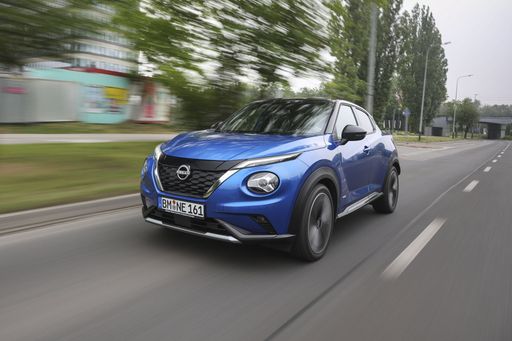 @ Nissan Motor Corporation
@ Nissan Motor Corporation
Nissan Juke
Dacia Spring
The Dacia Spring is an unpretentious city electric that strips EV ownership down to the essentials, offering clean, fuss-free transport for daily urban life. It won't impress luxury-seekers, but its cheerful practicality and rock-bottom running costs make it a clever, no-nonsense choice for anyone who wants electric mobility without the drama.
details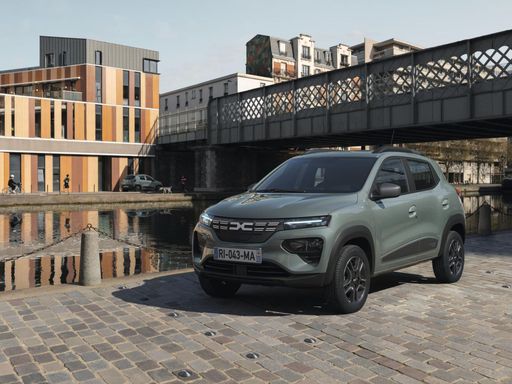 @ Dacia / Renault Group Media
@ Dacia / Renault Group Media
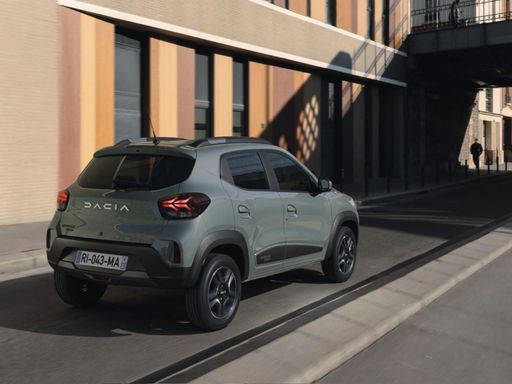 @ Dacia / Renault Group Media
@ Dacia / Renault Group Media
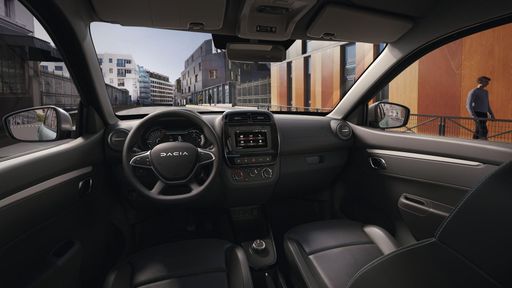 @ Dacia / Renault Group Media
@ Dacia / Renault Group Media
Nissan Juke
The Nissan Juke is a pocket-sized crossover that refuses to blend in, with quirky styling and a cheeky stance that turns heads at every traffic light. It’s ideal for shoppers who value personality and nimble urban driving over maximum practicality, delivering surprising pep and a well-equipped feel for everyday fun.
details @ Nissan Motor Corporation
@ Nissan Motor Corporation
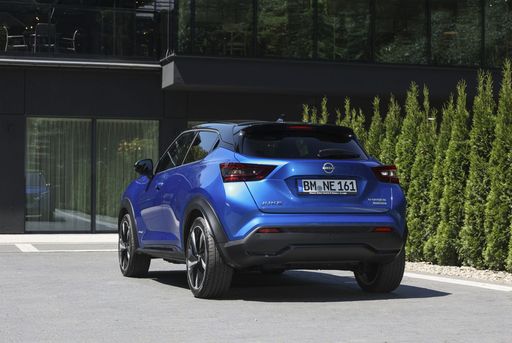 @ Nissan Motor Corporation
@ Nissan Motor Corporation
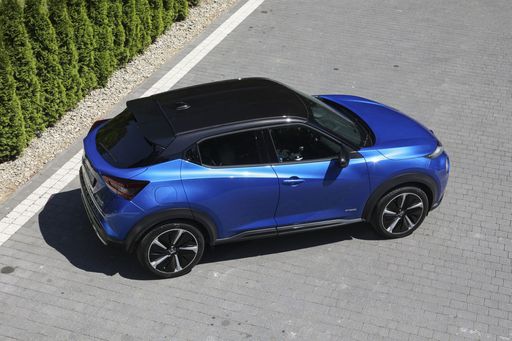 @ Nissan Motor Corporation
@ Nissan Motor Corporation
 @ Nissan Motor Corporation
@ Nissan Motor Corporation
 @ Dacia / Renault Group Media
@ Dacia / Renault Group Media
|
 @ Nissan Motor Corporation
@ Nissan Motor Corporation
|
|
|
|
Costs and Consumption |
|
|---|---|
|
Price
14500 - 17100 £
|
Price
21400 - 30100 £
|
|
Consumption L/100km
-
|
Consumption L/100km
4.7 - 6 L
|
|
Consumption kWh/100km
13.2 - 14.1 kWh
|
Consumption kWh/100km
-
|
|
Electric Range
225 - 228 km
|
Electric Range
-
|
|
Battery Capacity
26.80 kWh
|
Battery Capacity
0.60 kWh
|
|
co2
0 g/km
|
co2
107 - 136 g/km
|
|
Fuel tank capacity
-
|
Fuel tank capacity
46 L
|
Dimensions and Body |
|
|---|---|
|
Body Type
SUV
|
Body Type
SUV
|
|
Seats
4
|
Seats
5
|
|
Doors
5
|
Doors
5
|
|
Curb weight
1013 - 1050 kg
|
Curb weight
1274 - 1405 kg
|
|
Trunk capacity
308 L
|
Trunk capacity
354 - 422 L
|
|
Length
3701 mm
|
Length
4210 mm
|
|
Width
1583 mm
|
Width
1800 mm
|
|
Height
1519 mm
|
Height
1593 mm
|
|
Max trunk capacity
1004 L
|
Max trunk capacity
1237 - 1305 L
|
|
Payload
265 - 302 kg
|
Payload
405 - 427 kg
|
Engine and Performance |
|
|---|---|
|
Engine Type
Electric
|
Engine Type
Petrol, Full Hybrid
|
|
Transmission
Automatic
|
Transmission
Manuel, Automatic
|
|
Transmission Detail
Reduction Gearbox
|
Transmission Detail
Manual Gearbox, Dual-Clutch Automatic, Automatic Gearbox
|
|
Drive Type
Front-Wheel Drive
|
Drive Type
Front-Wheel Drive
|
|
Power HP
44 - 65 HP
|
Power HP
114 - 143 HP
|
|
Acceleration 0-100km/h
13.7 - 19.1 s
|
Acceleration 0-100km/h
10.1 - 11.8 s
|
|
Max Speed
125 km/h
|
Max Speed
166 - 180 km/h
|
|
Torque
113 - 125 Nm
|
Torque
200 Nm
|
|
Number of Cylinders
-
|
Number of Cylinders
3 - 4
|
|
Power kW
33 - 48 kW
|
Power kW
84 - 105 kW
|
|
Engine capacity
-
|
Engine capacity
999 - 1598 cm3
|
General |
|
|---|---|
|
Model Year
2024
|
Model Year
2024
|
|
CO2 Efficiency Class
A
|
CO2 Efficiency Class
D, E, C
|
|
Brand
Dacia
|
Brand
Nissan
|
What drive types are available for the Dacia Spring?
The Dacia Spring is available as Front-Wheel Drive.
The prices and data displayed are estimates based on German list prices and may vary by country. This information is not legally binding.
